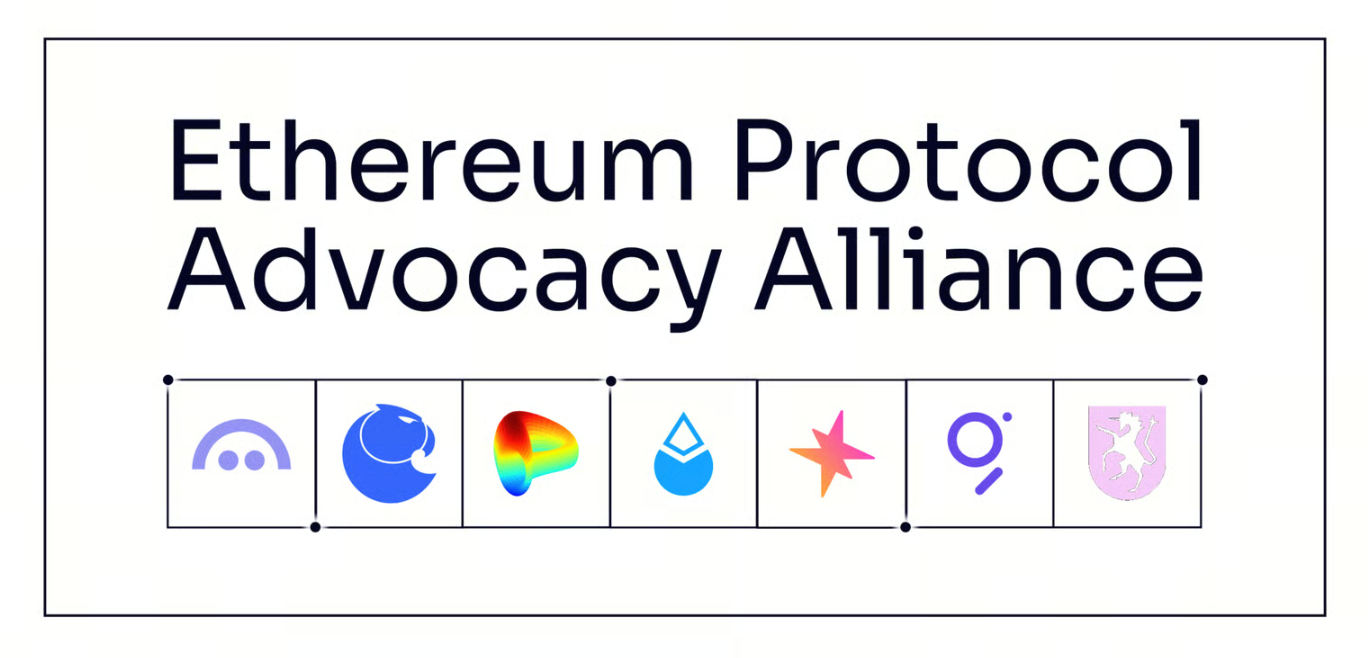The Formation of EPAA: A New Chapter in Ethereum’s Policy Engagement
Ethereum’s Voice Is Finally Being Heard

(Source: Ethereum Protocol Advocacy Alliance)
Since Ethereum’s launch, developers have pursued the mission of building an open network free from centralized control. In today’s regulatory climate, however, centralized authorities and vested interests typically steer policy decisions, leaving decentralized protocols without meaningful representation in legal and compliance debates.
This imbalance is starting to shift. Recently, seven leading Ethereum protocols jointly announced the creation of the Ethereum Protocol Advocacy Alliance (EPAA). Formed by core infrastructure development teams, the alliance aims to put open protocols at the center of policy conversations, advocating for greater transparency, rationality, and a true commitment to decentralization.
Seven Leading Protocols Join Forces
EPAA’s founding members are Aave Labs, Aragon, Curve, Lido Foundation, Spark Foundation, The Graph Foundation, and Uniswap Foundation.
Collectively, these protocols safeguard more than $100 billion in on-chain assets and serve as critical pillars for Ethereum’s financial and governance landscape. Their shared mission goes beyond defending their own interests. They are determined to ensure that the entire open-source ecosystem has a genuine voice in policy and regulatory matters. As the CEO of Uniswap Foundation emphasized in a public statement: “Decentralized protocols shouldn’t be treated as outliers in regulation—they’re the foundation for tomorrow’s innovation.”
EPAA’s Three Key Missions
- Strengthen Policy Dialogue and Technical Understanding
EPAA will bridge the Ethereum community and government, providing regulators with accurate, up-to-date technical information and clear explanations of how protocols self-govern, conduct security audits, and operate transparently—reducing regulatory misunderstandings. - Advance Cross-Protocol Collaboration and Innovation Frameworks
By coordinating standards and sharing expertise across protocols, EPAA plans to establish cross-chain and cross-protocol policy communication framework, ensuring that emerging technologies are not stalled by compliance obstacles. - Public Advocacy and Education
The alliance will organize public forums and educational initiatives to help mainstream audiences appreciate the value of decentralized infrastructure and improve the technical literacy of both citizens and policymakers regarding Web3.
Why EPAA Matters
Over the past several years, crypto markets have moved squarely into the policy spotlight. The stance of regulators, positions taken by central banks, and reactions from traditional finance are all shaping the future trajectory of Web3.
Historically, regulatory approaches have focused on centralized risk, lacking insight into open-source protocols. EPAA’s founding marks a shift: developers are now proactively engaging in policy, aligning open-source governance with regulatory dialogue. This change is pivotal not only for Ethereum but for the longevity of decentralized economies. For DeFi, it marks a transformation from protocol competition to policy collaboration.
Institutional Upgrades for Decentralized Governance
EPAA’s long-term roadmap covers several institutional objectives, including:
- Building a cross-border policy communication framework to foster trust between protocol developers and regulators;
- Developing compliance reference models for DAO governance and exploring the legal status of open organizations;
- Setting standards for on-chain audits to make transparency and security central requirements recognized by policymakers.
These initiatives show that decentralization is evolving from a technical buzzword to an institutionalized social practice recognized by policymakers.
If you’d like to learn more about Web3, click to register:https://www.gate.com/
Summary
The launch of EPAA is a landmark moment signaling Ethereum’s entry into a mature phase of governance. It represents not just a defensive alliance of technical communities, but a bold experiment in proactively shaping policy narratives. With more protocols and foundations expected to join, EPAA aims to become a central node in the global Web3 policy network. It will connect developers, regulators, and civic communities. Decentralization is moving from on-chain logic to real-world institutional frameworks. EPAA’s founding is a clear indication of this shift.
Related Articles

2025 BTC Price Prediction: BTC Trend Forecast Based on Technical and Macroeconomic Data

Flare Crypto Explained: What Is Flare Network and Why It Matters in 2025

Pi Coin Transaction Guide: How to Transfer to Gate.com

How to Use a Crypto Whale Tracker: Top Tool Recommendation for 2025 to Follow Whale Moves

What is N2: An AI-Driven Layer 2 Solution


